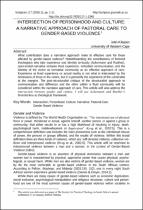| dc.contributor.author | Klaasen, John | |
| dc.date.accessioned | 2023-02-20T12:24:11Z | |
| dc.date.available | 2023-02-20T12:24:11Z | |
| dc.date.issued | 2018 | |
| dc.identifier.issn | 2305-445X | |
| dc.identifier.uri | https://doi.org/10.7833/117-1-1348 | |
| dc.identifier.uri | http://hdl.handle.net/10566/8443 | |
| dc.description.abstract | What contribution does a narrative approach make to effective care for those
affected by gender-based violence? Notwithstanding the contributions of feminist
theologians who take experience and identity seriously (Ackermann and Ruether),
open-ended narrative includes lived experience, embodied communication, and the
identity of the victim as formative community as an effective approach of care.
Experience as lived experience or actual reality is not what is interpreted by the
dominance of those in the centre, but it is primarily the experience of the vulnerable
at the margins. The post-structuralist critique of the structuralist approach to
communication and difference and the other within a fluid community will be
considered within the narrative approach of care. This article will also address the
intersection between gender and culture. I will use Ackermann and Ruether’s
feminist lens as theological framework | en_US |
| dc.language.iso | en | en_US |
| dc.publisher | Klaasen, J. (2018). Intersection of personhood and culture: A narrative approach of pastoral care to gender-based violence. Scriptura ,117 (1), 1-11. https://doi.org/10.7833/117-1-1348 | en_US |
| dc.subject | Culture | en_US |
| dc.subject | Pastoral care | en_US |
| dc.subject | Gender Based Violence | en_US |
| dc.subject | Identity | en_US |
| dc.subject | Religion | en_US |
| dc.title | Intersection of personhood and culture: A narrative approach of pastoral care to gender-based violence | en_US |
| dc.type | Article | en_US |

